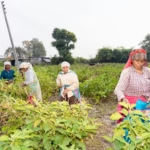
In recent years, African agriculture has seen a wave of transformation driven by both necessity and opportunity. The need to meet global food demands and the desire to uplift rural livelihoods have pushed many farmers across the continent to embrace modern farming practices. At the heart of this transformation lies African farming innovation—a combination of training, technology, and traditional knowledge tailored to Africa’s unique agricultural challenges and strengths.
As global standards for food safety, traceability, sustainability, and productivity continue to rise, African farmers are responding with ingenuity and determination. This shift is not only helping them compete in international markets but also improving food security and economic resilience across the region.
The Need for Innovation in African Agriculture
African agriculture has traditionally been labor-intensive and highly dependent on rainfall, with limited access to modern tools, financial resources, and market information. However, growing population pressure, climate change, and increased global trade have made it imperative for African farmers to modernize their operations.
To keep up with global quality and safety standards, African farming innovation is no longer optional—it’s essential. Whether it’s adopting climate-resilient crops, using mobile apps for real-time market prices, or implementing smart irrigation systems, innovation is shaping the future of farming in Africa.
Training: Laying the Foundation for Global Competitiveness
One of the core components of African farming innovation is training. Across the continent, governments, NGOs, and private companies are investing in capacity-building programs for farmers. These programs focus on:
- Good Agricultural Practices (GAP): Teaching farmers how to use fertilizers and pesticides responsibly, manage soil health, and minimize environmental impact.
- Post-harvest Handling: Training on proper storage, drying, and packaging to meet export standards and reduce food waste.
- Record Keeping and Traceability: Helping farmers maintain accurate records for certifications required by international buyers.
Organizations like the African Development Bank and various agricultural universities have played a critical role in making technical training accessible, especially to smallholder farmers who produce the bulk of the continent’s food.
This training empowers farmers to meet the expectations of international buyers and regulatory bodies, ultimately enabling them to participate more actively in global agricultural trade.
Technology: Accelerating the Pace of Progress
The rise of digital tools has brought about a revolution in African farming innovation. Mobile technology, in particular, has become a powerful tool for farmers. With a simple mobile phone, a farmer in rural Ghana can now:
- Access weather forecasts to plan planting and harvesting
- Receive alerts on pest outbreaks
- Get digital payments directly for produce
- Use GPS tools for precision farming
One standout example is the use of drone technology for crop monitoring and spraying. Drones allow for precise application of inputs, reducing costs and environmental harm while improving yields.
Another important technological advancement is digital agriculture platforms. These platforms connect farmers to input suppliers, buyers, extension officers, and transporters. By streamlining the agricultural supply chain, these platforms reduce inefficiencies and enable farmers to earn fairer prices for their goods.
Meeting Global Standards Through Innovation
Global markets demand consistency, quality, and traceability. African farming innovation is helping local farmers achieve just that. Through data-driven agriculture, smart logistics, and compliance with international certifications, African producers are slowly overcoming the barriers that once held them back.
Take, for instance, the example of Ahar Group, a company that sources agricultural commodities across Africa for international buyers. Ahar supports farmers not just by purchasing their produce, but by ensuring they are equipped with the knowledge and tools required to meet strict export standards. This includes guidance on post-harvest handling, quality control, and sustainable practices.
By connecting smallholder farmers to global markets, Ahar is fostering a culture of innovation and continuous improvement, ensuring that African agriculture remains competitive on the world stage.
Challenges That Remain
Despite the progress, several challenges still hinder the widespread adoption of African farming innovation. These include:
- Limited access to credit for purchasing modern inputs and tools
- Poor rural infrastructure that hampers transport and communication
- Digital illiteracy that makes it hard for older farmers to use new tech
- Policy gaps that slow down the scaling of successful innovations
However, these challenges also present opportunities. By addressing these barriers through public-private partnerships and investment in rural development, stakeholders can further accelerate the pace of innovation.
The Role of Youth in Driving Innovation
Another promising trend in African farming innovation is the growing interest among youth. More young people are returning to farming, not out of necessity, but as entrepreneurs. They are bringing fresh energy and a strong grasp of technology to modernize agriculture.
Startups led by young Africans are developing apps, creating value chains for niche products, and exploring climate-smart practices. Their involvement is critical to sustaining the long-term growth and modernization of the sector.
Conclusion
The journey toward global competitiveness in African agriculture is well underway, driven by a commitment to training, access to technology, and a growing culture of innovation. African farming innovation is no longer a distant goal—it is an everyday reality for thousands of farmers who are rethinking how they grow, process, and market their produce.
As organizations like Ahar Group continue to play a supportive role by empowering farmers and meeting international buyer expectations, the future looks promising. With sustained investment in education, digital tools, and infrastructure, African farmers can not only meet but exceed global standards.
By embracing innovation, African agriculture can unlock new levels of productivity and prosperity while ensuring that the continent plays a central role in feeding the world.











Add comment